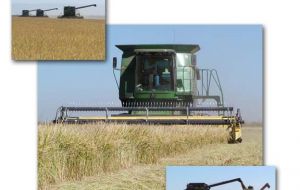MercoPress. South Atlantic News Agency
FAO says “some regulation• of commodities future markets is “desirable”
 Large commodity funds now hold about 25-35% of all agriculture futures contracts
Large commodity funds now hold about 25-35% of all agriculture futures contracts Some regulation of commodities futures markets is desirable, according to FAO, but any intervention should be cautious and stop short of imposing tight limits or an outright ban on such trading
In a policy brief recently published, FAO said the worldwide rise in food prices two years ago “might have been amplified by speculators in organized futures markets.
However, limiting or banning speculative trading might do more harm than good”.
While futures speculation appeared to have affected prices in the short term only, efforts to reduce such speculation might have unintended, longer-term consequences, the paper said. Any limitations could “divert speculators from trading and thus lower the liquidity in the markets available for hedging purposes”.
Futures contracts involve the formal obligation to sell or buy a given amount of a commodity at a specified time and price. They thus provide farmers and traders with an important defence or “hedge” against price risks.
However, only two percent of futures contracts actually end in the delivery of the physical commodity as they are generally traded before their expiration date. As a result such contracts, or obligations, are drawing growing numbers of financial speculators and investors, especially as they can provide attractive returns when equities and bonds may become unappealing.
Large commodity funds now hold about 25-35% of all agriculture futures contracts and, with other investors, have become an important source of liquidity to the market.
But mechanisms to intervene in future markets if prices rise too sharply might divert speculators from trading and thus make less money available for important hedging purposes.
Accordingly, “proposals to create an international fund to react to price hikes might therefore not be an optimal solution,” the paper cautioned. “What is more, such a fund would require exorbitant resources to counteract speculation effectively,” it noted.
Instead, regulatory measures should aim primarily at enhancing confidence in the good functioning of the market. One way this could be achieved, the brief continued, was by increasing transparency and the amount of available information on futures trading.
Another would be to closely investigate any instances of suspicious behaviour by traders, as already practiced by the US futures trading supervisory body.
“Commodity futures have become an integral part of the food market, and they perform an important role for many market participants. Adequate regulation should improve, not ban, speculative trading in order to foster market performance,” the brief concluded.
FAO Policy Briefs are intended to provide guidance on today's global policy challenges related to food and agriculture. Written in non-technical language, they explain why policy makers need to address a particular issue and how they might do so.




Top Comments
Disclaimer & comment rulesCommenting for this story is now closed.
If you have a Facebook account, become a fan and comment on our Facebook Page!